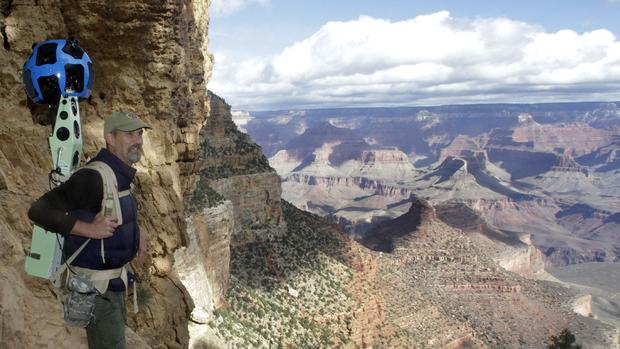Google street view expands into Grand Canyon trails
GRAND CANYON NATIONAL PARK, Ariz. Google and its street-view cameras already have taken users to narrow cobblestone alleys in Spain using a tricycle, inside the Smithsonian with a push cart and to British Columbia's snow-covered slopes by snowmobile.
The search giant now has brought its all-seeing eyes -- mounted for the first time on a backpack -- down into the Grand Canyon, showcasing the attraction's most popular hiking trails on the South Rim and other walkways.
It's the latest evolution in mapping technology for the Mountain View, Calif., company, which has used a rosette of cameras to photograph thousands of cities and towns in dozens of countries for its Street View feature. With a click of the mouse, Internet users are transported virtually for a 360-degree view of locales they may have read about only in tourist books and seen in flat, 2-D images.
"Any of these sort of iconic, cultural, historical locations that are not accessible by road is where we want to go," said Ryan Falor, product manager at Google.
Google announced the trekker earlier this year but made its first official collection of data this week at the Grand Canyon. The backpacks aren't ready for volunteer use, but Google has said it wants to deploy them at national forests, to the narrow streets of Venice, Mount Everest and to ancient ruins and castles. The move to capture the Grand Canyon comes after Apple chose to drop Google Maps from its mobile operating systems and opted to use its own mapping program that was derided for, among other things, poor directions and missing towns.
Steve Silverman, operations manager for Google didn't directly address the competition in saying: "Just trying to document a trail, it's going to be hard to beat this."
Google launched its Street View feature in 2007 and has expanded from 5 U.S. cities to more than 3,000 in 43 countries. Google teams and volunteers have covered more than 5 million miles with the Street View vehicles on a scale that other companies haven't approached, said Mike Dobson, president of Telemapics, a company that monitors mapping efforts.
"You could safely say that it's a standout, well-used application and they don't really have any competition," he said.
As the sun rose Monday, Luc Vincent, Google engineering director, strapped on one of the 40-pound backpacks and set down the Bright Angel Trail to the Colorado River - a nearly 10-mile hike that goes from 6,900 feet in elevation to 2,400 feet. He hiked back up from Phantom Ranch, which can be 30 degrees warmer than at the rim, through the South Kaibab Trail and also gathered data on other trails.
The so-called trekker captures images every 2.5 seconds with 15 cameras that are 5 megapixels each, from the rest areas, the steep switchbacks, the change from juniper trees to scrub brush and the traffic that moves aside as a courtesy to mule riders.
The GPS data is limited, so Google must compensate with sensors that record temperature, vibrations and the orientation of the device as it changes, before it stiches the images together and makes them available to users in a few months, Falor said. Hikers that were on the trail when the data was gathered will have their faces blurred - an attempt by Google to ensure privacy. Street View has run into problems in places like Europe and Australia for scooping up information transmitted over unsecured wireless networks.
A removable hard drive on the trekker stores the data gathered at the Grand Canyon. Tourists looked at the trekker strangely this week, as if it was something from outer space.
Sharon Kerfoot, a first-time visitor from Alberta said being able to view the terrain ahead of time, gauge the difficulty of the hike and know just how wide the path is would benefit those considering a trip to the Grand Canyon. She and a group of friends headed down the same path as Vincent but on mules, not foot.
"I think it's an excellent idea to give people a broader perspective on what they're getting into," she said.
What the images won't tell visitors is how much water they should carry down the trails, how to prepare for temperature changes, what type of food to bring and how much, and how best to protect the natural resources, park spokeswoman Maureen Oltrogge said.
"Stitched together with other information out there, the technology could be valuable," she said.
